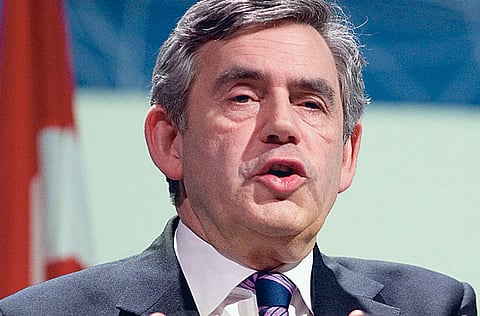Brown's temper is irrelevant
The UK press should be paying attention to the coming election, not Rawnsley's book

I have been trying really hard to get worked up about the latest stories of Gordon Brown's bad temper. I have drunk a gallon of coffee, done some star-jumps, read the coverage three or four times, shouted at various radios and televisions, stomped up and down the road. And do you know what? Nothing. Nada. I just can't do it. Excited? Surprised? Not at all.
Andrew Rawnsley, from The Observer, is a fine and trustworthy journalist. When he says his new account of Brown's premiership is based on meticulous and numerous interviews, I believe him. And when Lord Mandelson dismisses this account, I'm inclined to disbelieve him. When Rawnsley says he has left out dramatic stories about the prime minister's temper because he hasn't been able to source them well enough, I believe that, too. Such stories have been doing the rounds for a year. A book based on unverified tittle-tattle would have been easy to write, and more lurid than this.
The problem is that revelations about Brown's expressions of anger and frustration in private are hardly news. The picture of a driven, short-tempered and sometimes foul-mouthed man inclined to bully those around him, or at least to vent his frustration in ways that intimidate them, is familiar. It is only one part of Brown's character. He is also a serious man who struggles hard to resolve difficult policy problems and who possesses remarkable staying power.
That much the public knows. It is some way from the tales of almost deranged anger that were current a year or six months ago. My reading of Brown, from talking to ministers, is that he did have a period of near-meltdown — when he realised the wheels were coming off his premiership, and he was staring into the political abyss — but has partly recovered since. He is clearly tougher than the ministers who were plotting against him. He has found, once again, a story to tell.
Meanwhile, just as David Cameron once scooped easy plaudits by comparison with Brown, now the Tory leader doesn't look quite so impressive. The polls have narrowed. Still, the election is going to be far more interesting than we could have expected only a few months ago. Could it be that the stream of Blairites leaving politics, with James Purnell the latest and perhaps most serious loss, have been making a mistake — jumping from a ship that is waterlogged but not actually sinking? A few months ago, the Rawnsley book might have come like a final blow. Not now. He has taken some paint off the prime minister's car, but he hasn't caused a crash.
Focus on policy
The election will be about what it should be about, which is economic and social policy. In terms of pure politics, this spring's budget will be the most important for a generation. It is crucial to understand that Alistair Darling, perhaps the only Labour politician whose reputation has risen lately, cannot deliver a cynically political budget. If he tried it, the markets would panic, the pound would collapse, and a Tory landslide would be certain. Optimistic talk of the fruits of economic growth, and calculated vagueness, will come across as disingenuous blather.
Darling has to produce convincing numbers to explain how he intends to slash the deficit, which will be a legal requirement. We know pain is coming, both in spending cuts and (probably) further tax rises. But the timing and placing of the cuts are still mysterious. Should VAT rise? Should Trident go? What will happen to the financing of council services? Will middle-class university students be made to pay more?
These are some of the decisions that matter hugely to the whole country, even if the next set of figures in April confirm that Britain is still just out of recession. George Osborne has to produce a plan that is at least as clear. Again, if the Tories try to fudge it, they will lose any lead in economic competence and could even lose the election.
I can't wait. Nor can I honestly say that this battlefield will help Labour fight back. A stuttering recovery, in a country that has lost so many jobs and companies, whose education system continues to underperform, and in which inequality has increased, is not a sound basis for political revival. The bleeding away of talent and experience means Labour's top team seems denuded and short of new thinking.
My guess is that, in the end, the electorate will remain bored and fed up with Labour, and that the Tories will have spent so heavily in the key marginals, that Cameron will make it. What has changed is that this is no longer dead certain. Labour is reeling, but still standing. Nick Clegg is doing far better with the Liberal Democrats than the Westminster in-crowd has noticed, so a hung parliament is indeed possible. A minority Tory administration would be a nightmare for Cameron — and after it, anything could happen.
Anyone who's interested in politics ought to be gripped by what's ahead. The choices are big. The polls are narrow. That's what to get excited about, not Brown's titanic grumpiness. I don't want to sound po-faced. A little tittle, a touch of tattle? Fine by me. But it's time to move on.
